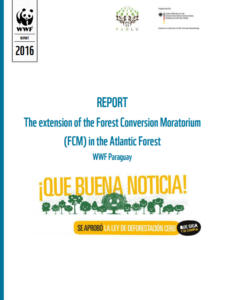The following documents aim to inform and raise awareness about the importance of sustainable use of forests and national REDD + process both globally and locally. You will find a selection of major publications on the REDD+ process and developments in the ParLu project.
REDD+
This is the report of the project “The extension of the Forest Conversion Moratorium (FCM) in the Atlantic Forest” (July 2012 – January 2016). The three and a half years have witnessed very changing political environments, from 2012’s impeachment, to a transitory establishment and the general elections in April 2013. The FCM project has had the capacity to adapt to rapid changes and to remain focused on its very own goals.
Business plan. REDD+ Golondrina. 2013. UNIQUE.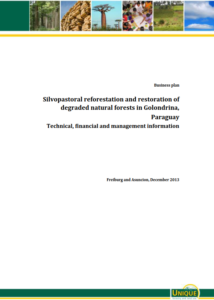
The business plan is prepared for a REDD+ compatible forestry production project. This document describes the technical details, financial performance and the management structure of the planned forestry production project on Estancia Golondrina.
Business plan. REDD+ Volendam. 2013. UNIQUE.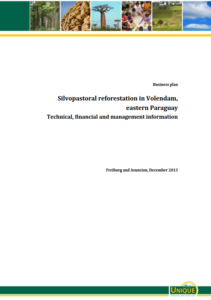
The proposed project is envisioned to be implemented by the Forest Service of the Cooperative Volendam on a total area of approximately 300 ha, depending on the interest of the cooperative land owners to invest in reforestation activities. This document describes the technical details, financial performance and the project management structure of the planned silvopastoral reforestation activity.
ParLu Project reports & results
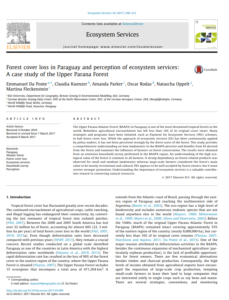 Paper: Forest cover loss in Paraguay and perception of ecosystem services: A case study of the Upper Parana Forest. 2017. Emmanuel Da Ponte, Claudia Kuenzer, Amanda Parker, Oscar Rodas, Natascha Oppelt, Martina Fleckenstein.
Paper: Forest cover loss in Paraguay and perception of ecosystem services: A case study of the Upper Parana Forest. 2017. Emmanuel Da Ponte, Claudia Kuenzer, Amanda Parker, Oscar Rodas, Natascha Oppelt, Martina Fleckenstein.
The Upper Parana Atlantic Forest (BAAPA) in Paraguay is one of the most threatened tropical forests in the world. Relentless agricultural encroachment has left less than 10% of its original cover intact. Many strategies and programs have been initiated, such as Payment for Ecosystem Services (PES) schemes, to halt forest cover loss. This study provides a comprehensive understanding on how landowners in the BAAPA perceive and benefits from ES derived from the forest and examines the influence of farmers on forest conservation. The results were obtained from an extensive household survey performed in the BAAPA region.
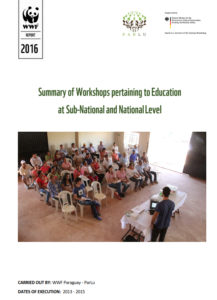 Report. 2016. Summary of Workshops pertaining Education at Sub-National and National Level.
Report. 2016. Summary of Workshops pertaining Education at Sub-National and National Level.
This document highlights workshops notes and activities which correspond to the following project objectives:
- Conduct six workshops to educate about REDD+ with sub-national (small, medium, and large producers, local communities, and indigenous communities) and national partners.
- Support and encourage the participation of Paraguay’s National REDD+ Commission and other relevant partners in the process of workshop implementation.
Executive Summary of ParLu Blueprints.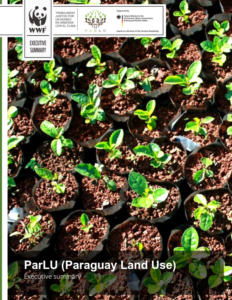 2016. WWF
2016. WWF
The ParLu project focused on the design and development of measures for REDD+ integration with a multi-level approach for
various political, social and economic factors. This blueprint document examines these issues in the light of recent project evidence.
The objective of this document is to compile and share lessons learned which include success factors, best practices, limitations and opportunities. Ultimately, the blueprint provides general recommendations on REDD+ country preparation and aims to propose activities adept for scaling up, which could inform future national climate change and REDD+ strategies and land-use policies in Paraguay.
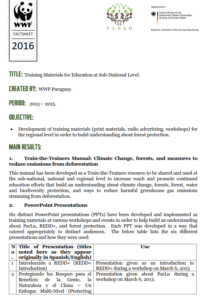 Factsheet. Training Materials for Education at Sub-National Level. 2016. WWF.
Factsheet. Training Materials for Education at Sub-National Level. 2016. WWF.
Objective:
- Development of training materials (print materials, radio advertising, workshops) for
the regional level in order to build understanding about forest protection.
Information. Payments for Ecosystem Services: Background information and Evaluation of Case Studies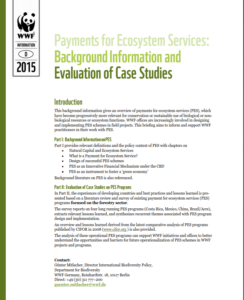 . 2015. WWF.
. 2015. WWF.
This background information gives an overview of payments for ecosystem services (PES), which have become progressively more relevant for conservation or sustainable use of biological or non-biological resources or ecosystem functions. WWF offices are increasingly involved in designing and implementing PES schemes in field projects. This briefing aims to inform and support WWF practitioners in their work with PES.
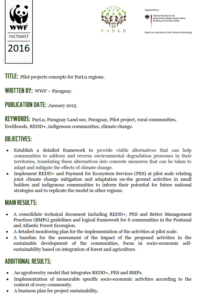
Factsheet. Pilot projects concepts for ParLu regions. 2015. WWF.
Main results:
- A consolidate technical document including REDD+, PES and Better Management
Practices (BMPs) guidelines and logical framework for 6 communities in the Pantanal
and Atlantic Forest Ecoregion. - A detailed monitoring plan for the implementation of the activities at pilot scale.
- A baseline for the assessment of the impact of the proposed activities in the
sustainable development of the communities, focus in socio-economic selfsustainability
based on integration of forest and agriculture.
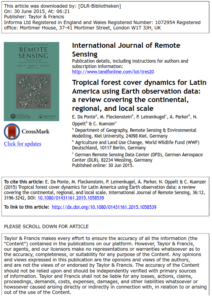 Paper. Tropical forest cover dynamics for Latin America using Earth observation data: a review covering the continental, regional, and local scale. 2015. Da Ponte, Emmanuel und Fleckenstein, Martina und Leinenkugel, Patrick und Parker, Amanda und Oppelt, Natascha und Künzer, Claudia. International Journal of Remote Sensing, 36 (12), Seiten 3196-3242.
Paper. Tropical forest cover dynamics for Latin America using Earth observation data: a review covering the continental, regional, and local scale. 2015. Da Ponte, Emmanuel und Fleckenstein, Martina und Leinenkugel, Patrick und Parker, Amanda und Oppelt, Natascha und Künzer, Claudia. International Journal of Remote Sensing, 36 (12), Seiten 3196-3242.
Latest studies conducted on a global scale identified the Latin American continent as one of the regions exhibiting the highest rates of deforestation in the world. The dynamics of forests over the past 40 years has attracted numerous remote-sensing-based studies to monitor forest loss, analyse patterns, and understand the drivers of land conversion. This review article provides a comprehensive overview of the remote-sensing-based studies of tropical forest dynamics in Latin America. Furthermore, a case study for the whole of Paraguay is presented.
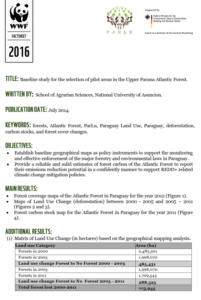 Factsheet. Baseline study for the selection of pilot areas in the Upper Parana Atlantic Forest. 2014. School of Agrarian Sciences, National University of Asuncion.
Factsheet. Baseline study for the selection of pilot areas in the Upper Parana Atlantic Forest. 2014. School of Agrarian Sciences, National University of Asuncion.
Objectives:
- Establish baseline geographical maps as policy instruments to support the monitoring
and effective enforcement of the major forestry and environmental laws in Paraguay. # - Provide a reliable and solid estimates of forest carbon of the Atlantic Forest to report
their emissions reduction potential in a confidently manner to support REDD+ related
climate change mitigation policies.
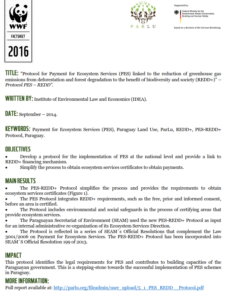 Factsheet. Protocol for Payment for Ecosystem Services (PES) linked to the reduction of greenhouse gas emissions from deforestation and forest degradation to the benefit of biodiversity and society (REDD+). 2014. Institute of Environmental Law and Economics (IDEA).
Factsheet. Protocol for Payment for Ecosystem Services (PES) linked to the reduction of greenhouse gas emissions from deforestation and forest degradation to the benefit of biodiversity and society (REDD+). 2014. Institute of Environmental Law and Economics (IDEA).
Objectives:
- Develop a protocol for the implementation of PES at the national level and provide a link to
REDD+ financing mechanism. - Simplify the process to obtain ecosystem services certificates to obtain payments.
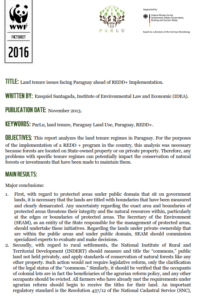 Factsheet. Land tenure issues facing Paraguay ahead of REDD+ Implementation. 2013. Ezequiel Santagada, Institute of Environmental Law and Economic (IDEA).
Factsheet. Land tenure issues facing Paraguay ahead of REDD+ Implementation. 2013. Ezequiel Santagada, Institute of Environmental Law and Economic (IDEA).
This report analyzes the land tenure regimes in Paraguay. For the purposes of the implementation of a REDD + program in the country, this analysis was necessary because forests are located on State-owned property or on private property. Therefore, any problems with specific tenure regimes can potentially impact the conservation of natural forests or investments that have been made to maintain them.
Factsheet. Extension of the Zero Deforestation Law.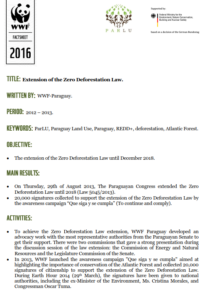 2013. WWF
2013. WWF
On Thursday, 29th of August 2013, The Paraguayan Congress extended the Zero Deforestation Law until 2018 (Law 5045/2013).
20,000 signatures collected to support the extension of the Zero Deforestation Law by
the awareness campaign “Que siga y se cumpla” (To continue and comply).
Other project related documents
Baseline study
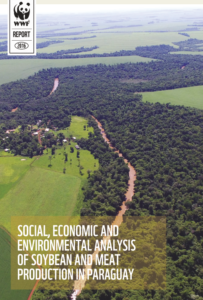 Report. Social, economic and environmental analysis of soybean and meat production in Paraguay. 2016. WWF.
Report. Social, economic and environmental analysis of soybean and meat production in Paraguay. 2016. WWF.
The creation of new markets, which recognize the impor- tance of sustainable production, opens new possibilities for countries such as Paraguay. Faced with the challenge of development and building a green economy, WWF, throu- gh its MTI analyzes the characteristics of two of the main areas of production in the country: soybean and meat. This analysis seeks to contextualize these areas of production, taking into account not only their importance for econo- mic development, but also the social and environmental dimensions in which they develop.




